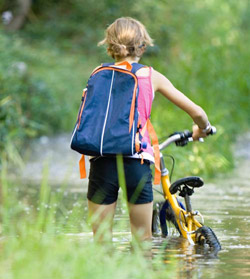Propane and Flood Safety
Steps to keep you and your family safe
 Floods can occur anywhere during any season of the year. Each year, floods cause billions of dollars in damage to homes and businesses. If your home or business uses propane to generate heat or run appliances, there are a few simple steps you can take to keep your family safe and avoid potential dangers.
Floods can occur anywhere during any season of the year. Each year, floods cause billions of dollars in damage to homes and businesses. If your home or business uses propane to generate heat or run appliances, there are a few simple steps you can take to keep your family safe and avoid potential dangers.
- Create an emergency preparedness plan and review it with everyone in your family. Post a list with contact information for your propane retailer and emergency services along with instructions for turning off propane, electricity, and water.
- In flood zone areas, make sure your large above-ground and underground propane tanks are anchored securely to avoid potentially dangerous situations. Contact your propane retailer for more information.
- In the event that a flood threatens your safety, you should shut off the gas. Turn off the main gas supply valve on your propane tank, if it is safe to do so. Also, turn off the gas supply valves located near individual indoor appliances. You may have to evacuate your property or move to a higher level within your home.
- After the flood danger passes and it is safe to do so, check the entire area for downed power lines, damaged gas lines, or damage to your propane tank. If it is dark, use flashlights, not candles. Immediately call your local utility company or propane retailer if any of these hazards exist. Do not attempt repairs yourself. If you find a propane tank on your property that is not yours, or if your propane tank has become dislodged or is missing, contact your propane retailer or your local fire department immediately.
- Never use outdoor propane appliances indoors or in enclosed areas. This can result in carbon monoxide poisoning or death. These include such appliances as outdoor portable heaters, barbecue grills, and portable generators. Only use appliances indoors that are designed and approved for indoor use. Never store, place, or use a propane cylinder indoors or enclosed areas such as a basement, garage, shed, or tent.
- Inspect your propane appliances for water or other damage, if it is safe to do so. If the appliances have electric components and have been exposed to water, they can create a fire hazard. Do not
ever turn on a light switch, use any power source, or inspect your household appliances while standing in water.
- Have a qualified service technician perform a complete inspection of your propane systemif you suspect any of your propane appliances, equipment, or vehicles have been damaged, or you have turned off your gas supply. Never use or operate appliances, equipment, or vehicles, or turn on the gas supply, until your system has been inspected by a qualified service technician. Do not attempt repairs yourself.
- Take immediate action if you smell gas inside or outside of your home or business. Follow these simple instructions:
- No flames or sparks! Immediately put out all smoking materials and other open flames. Do not operate or turn on or off lights, appliances, telephones, or cell phones.
- Leave the area immediately! Get everyone out of the building or area where you suspect gas is leaking.
- Shut off the gas. Turn off the main gas supply valve on your propane tank, if it is safe to do so. To close the valve, turn it to the right (clockwise).
- Report the leak. From a neighbor’s home or other building away from the gas leak, call your propane retailer right away. If you can’t reach your propane retailer, call 911 or your local fire department.
- Do not return to the building or area until your propane retailer, emergency responder, or qualified service technician determines that it is safe to do so.
- Get your system checked. Before you attempt to use any of your propane appliances, your propane retailer or a qualified service technician must check your entire system to ensure that it is leak-free.
 Floods can occur anywhere during any season of the year. Each year, floods cause billions of dollars in damage to homes and businesses. If your home or business uses propane to generate heat or run appliances, there are a few simple steps you can take to keep your family safe and avoid potential dangers.
Floods can occur anywhere during any season of the year. Each year, floods cause billions of dollars in damage to homes and businesses. If your home or business uses propane to generate heat or run appliances, there are a few simple steps you can take to keep your family safe and avoid potential dangers.